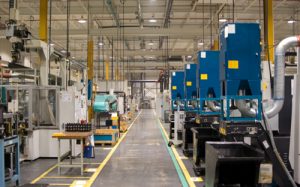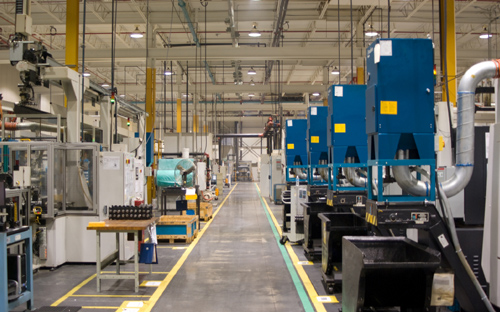Poor handling of the Nigerian economy has not deterred manufacturers from expanding capacities and factories this year.
Amid factory expansion, manufacturers are also looking more inwards for their raw materials, leading to a significant rise in local input preference to 63.2 percent between 2017 and this year, as against 51.1 percent in 2016, latest data from the Manufacturers Association of Nigeria (MAN) show.
Manufacturers say governments at all levels must review land laws and protect their investments with consistent policies and cheap funds.
Beloxxi, on February 9, this year launched the second and third phases of its biscuit lines in Agbara, Ogun State. Beloxxi Industries is one of the largest biscuit makers in Nigeria with a capacity to produce 40,000 metric tons (MT) per annum, amounting to 28 million cartons.
The biscuit firm in 2016 closed an $80 million deal with a consortium of 8 Miles (London), African Capital Alliance (Nigeria) and KFW DEG Bank (Germany). The investment is raising the company’s capacity from 40,000MT to 80,000MT while the staff strength is over 3,700.
“Access to capital is a major challenge facing us. We also need to localise the value chain in manufacturing,” Obi Ezeude, CEO of Beloxxi’s Industries, said during the commissioning of the lines by Nigeria’s vice president Yemi Osinbajo.
On the same day, a N4.1 billion Nestle Milo Ready-to-Drink (RTD) beverage plant was also commissioned by Osinbajo in Agbara. The plant manufactures Nestlé Milo Ready-To-Drink (RTD) beverage in 180ml cartons and has a yearly production capacity above 8,000 tonnes.
“This new production plant is a true reflection of how Nestlé creates shared value for all, by providing good jobs, sourcing 80 per cent of our inputs with local farmers and investing in the development of rural communities,” said Mauricio Alarcon, managing director and CEO of Nestlé Nigeria.
A new 30,000 metric tonnes per annum cocoa processing plant in Ikom, Cross River State, is over 60 percent completed and may be commissioned in December, according to BusinessDay checks.
“This is the first cocoa processing plant that will process cocoa beans to chocolate,” Ben Ayade, Cross River State governor, said last month.
In March, Dangote Group inaugurated a multi-billion Naira rice processing mill in Hadin, Jigawa state.
The mill has the capacity to process 16 metric tons of paddy rice per hour as well as N14 billion worth of rice annually directly from the famers in Jigawa at market rate.
 “We have continued to pioneer new approaches to empowering our primary stakeholders and our farmers, through the Dangote Outgrowers Programme, thereby creating thousands of jobs, increasing incomes, poverty reduction in rural communities by providing high quality agro-inputs, technical support and secured market for farmers. We are also creating access to finance, mechanisation and irrigation services so as to enhance agricultural productivity,” Aliko Dangote, president of the Group, said.
“We have continued to pioneer new approaches to empowering our primary stakeholders and our farmers, through the Dangote Outgrowers Programme, thereby creating thousands of jobs, increasing incomes, poverty reduction in rural communities by providing high quality agro-inputs, technical support and secured market for farmers. We are also creating access to finance, mechanisation and irrigation services so as to enhance agricultural productivity,” Aliko Dangote, president of the Group, said.
Similarly, a rice seedling factory was inaugurated in Cross River in June.
Furthermore, BUA Group last month commissioned a 1.5 million metric tonnes Kalambaina cement plant in Sokoto State, which gulped $350 million to build.
The ultramodern cement plant has a 32 megawatts multi-fuel captive power plant and a coal mill, blessed with huge limestone deposits.
BUA is also building a $1 billion Obu Cement Complex in Okpella, Edo State.
By the time the Okpella plant is completed at year end, BUA’s total production capacity will hit eight million MT and would give 35 percent of the entire volumes produced in Nigeria.
Abdul Samad Rabiu, chairman and CEO of BUA Group, said the new plant would be generating more power than is currently generated by the entire Sokoto State.
Moreover, BASF West Africa has a construction chemicals production facility in Lagos and has made a number of investments this year.
Manufacturers are looking for more local raw materials to reduce exposure to exchange rate volatility. A dollar currently exchanges for over N360 as against N199 in 2014. A number of them are investing billions in backward integration projects.
Nigerian economy emerged from recession last year, which shut down over 50 firms, according to MAN. Inflation was 11.2 percent in July while Monetary Policy Rate is 14 percent.
“We need to know that there is a strong nexus between political stability and economic progress. We should not create a situation where citizens and investors (domestic and foreign) lose confidence in the state institutions,” Babatunde Paul Ruwase, president of the Lagos Chamber of Commerce and Industry, said last week, while analysing the impact of elections on investments.











